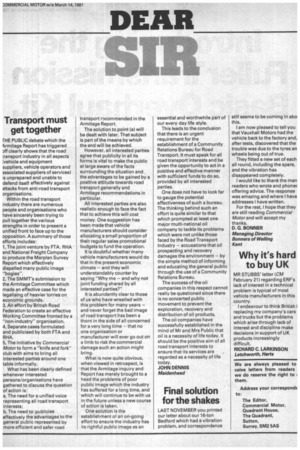Transport must get together
Page 25

If you've noticed an error in this article please click here to report it so we can fix it.
I-HE PUBLIC debate which the 4rmitage Report has triggered )ff clearly shows that the road transport industry in all aspects :vehicle and equipment
suppliers, vehicle operators and associated suppliers of services) Is unprepared and unable to defend itself effectively against attacks from anti-road transport organisations.
Within the road transport industry there are numerous people and organisations who have sincerely been trying to pull together the various strengths in order to present a unified front to face up to the opposition. A summary of those efforts includes: 1, The joint venture by FTA, RHA and National Freight Company to produce the Marplan Survey Report which effectively dispelled many public image "bogies".
2, The SMMT's submission to the Armitage Committee which made an effective case for the legalising of heavier lorries on economic grounds.
3, An effort by British Road Federation to create an effective Working Committee fronted by a "non-industry" organisation.
4, Separate cases formulated and publicised by both ETA and RHA.
5, The initiative by Commercial Motorto form a "knife and fork" club with aims to bring all interested parties around one table informally.
What has been clearly defined whenever interested persons/organisations have gathered to discuss the question of action is: a, The need for a unified voice representing all road transport interests; b, The need to publicise effectively the advantages to the general public represented by more efficient and safer road transport recommended in the Armitage Report.
The solution to point (a) will be dealt with later. That subject is part of the means by which the end will be achieved.
However, all interested parties agree that publicity in all its forms is vital to make the public at large aware of the facts surrounding the situation and the advantages to be gained by a positive attitude towards road transport generally and Armitage recommendations in particular.
All interested parties are also realistic enough to face the fact that to achieve this will cost • money. One suggestion has been made that vehicle manufacturers should consider allocating a small proportion of their regular sales promotional budgets to fund the operation.
It is doubtful whether many vehicle manufacturers would do that in the present economic climate—and they will understandably counter by saying "Why me — and why not joint funding shared by all interested parties?"
It is abundantly clear to those of us who have wrestled with this problem for many years — and never forget the bad image of road transport has been a thorn in the side of all concerned for a very long time — that no one organisation or manufacturer will ever go out on a limb to risk the commercial damage such an action might bring.
What is now quite obvious, when viewed in retrospect, is that the Armitage inquiry and Report has merely brought to a head the problems of poor public image which the industry has suffered for a long time, and which will continue to be with us in the future unless a new course of action is taken.
One solution is the establishment of an on-going effort to ensure the industry has its rightful public image as an essential and worthwhile part of our every day life. style.
This leads to the conclusion that there is an urgent requirement for the establishment of a Community Relations Bureau for Road Transport. It must speak for all road transport interests and be given the opportunity to act in a positive and effective manner with sufficient funds to do so, provided by all interested parties.
One does not have to look far to gauge the potential effectiveness of such a bureau. The thinking behind such an effort is quite similar to that which prompted at least one major multi-national oil company to tackle its problems which were not unlike those faced by the Road Transport Industry — accusations that oil prospecting and recovery damages the environment — by the simple method of informing and educating the general public through the use of a Community Relations Bureau.
The success of the oil companies in this respect cannot really be questioned since there is no concerted public movement to prevent the exploration, recovery and distribution of oil products. The oil companies have successfully established in the mind of Mr and Mrs Public that .oil is a necessity of life today. It should be the positive aim of all road transport interests to ensure that its services are , regarded as a necessity of life today.
JOHN DENNIS
Maidenhead




























































































